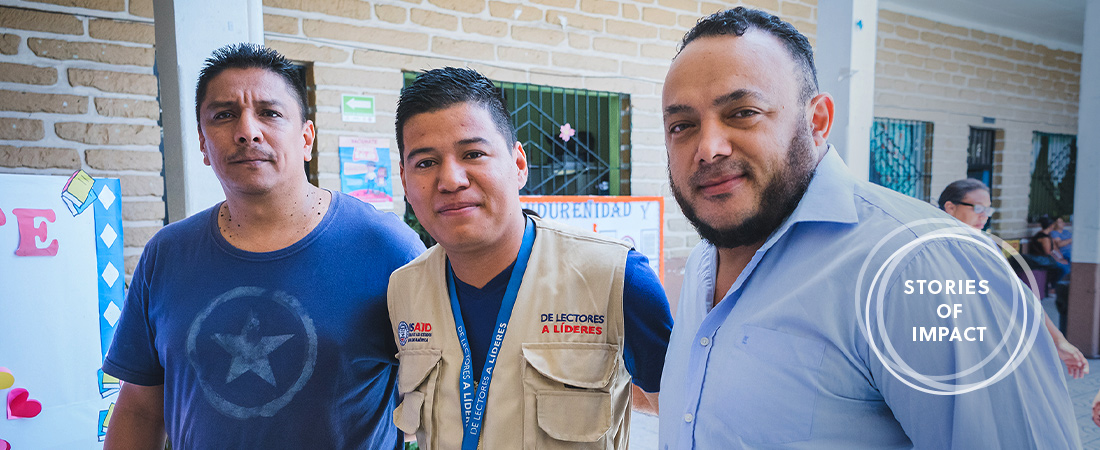Fathers Stepping Up for Literacy

Walter and Juan Carlos with Ricardo Soriano (middle), who works on USAID Honduras Reading Activity.
It is 8 o’clock in the morning at the July 14 School in Tegucigalpa, Honduras, and Walter Blanco and Juan Carlos Garay are cutting and gluing letters to a bulletin board. Nobody would find fault with these two tired fathers going home to rest—they both work the night shift—but today, as on many occasions, they are volunteering at their children’s school.
“Our goal is to motivate our children to do well in school,” says Garay. “We want them to be successful.”
Positive male role models can make a big difference in the life of a child. However, according to a recent study conducted by EDC through the USAID Honduras Reading Activity (HRA), fathers like Garay and Blanco are not the norm in Honduras.
In the study, fathers and male caregivers identified several key barriers to participation, including lack of time, economic difficulties, and their own low levels of education. Traditional gender roles and social norms, which minimize the importance of men’s equitable involvement in children’s care and education, also discourage them from active participation.
HRA is challenging these attitudes. As part of its work with local parent-teacher associations, the project identifies men who are already actively engaged in their children’s education and promotes them as models for their peers. To date, the project has reached a total of 2,467 parents—545 of whom are fathers or male caregivers—through these efforts.
The hope is that more men will become engaged in their children’s education if they see other fathers and male caregivers overcoming similar barriers. This engagement can have positive results: schools become more vibrant places to learn; children have better learning outcomes; and families can establish stronger roots within their communities. It can also cut down on fathers’ perception that they need to leave the country in order to build a better life.
“There are real barriers to fathers’ participation at school and at home,” says EDC’s Hannah Kuntz, who led the study. “But there are fathers, like Walter and Juan Carlos, who really want to make a difference, and we hope that promoting their efforts will encourage more fathers to do the same.”
In this regard, Blanco and Garay are leading by example. They recently supported a reading contest for struggling readers at their school and then invited parents and community members to attend. While the focal point of the event was motivating young readers, it was important because it also engaged fathers (and mothers) in their children’s education, explains Blanco.
“We need to be conscientious that as fathers we are not only responsible for the [financial] care of our children, we need to be present in our children’s education as well,” Blanco says.
HRA is raising awareness about the barriers that fathers face while also helping schools develop more “father friendly” practices. For example, the project encourages schools to hold meetings and educational activities during the afternoon or on weekends when fathers are not typically at work. Project staff are also working with school directors and teachers to find ways to incentivize fathers’ participation in their children’s education.
Perhaps most importantly, the project is working to empower fathers to find ways to support their children’s learning at home. Not only does this involvement help to boost children’s reading and writing skills, but it is also a necessary step toward building more resilient and equitable homes and communities in Honduras.
“We look forward to the day when Walter and Juan Carlos are no longer the exception,” says Kuntz.